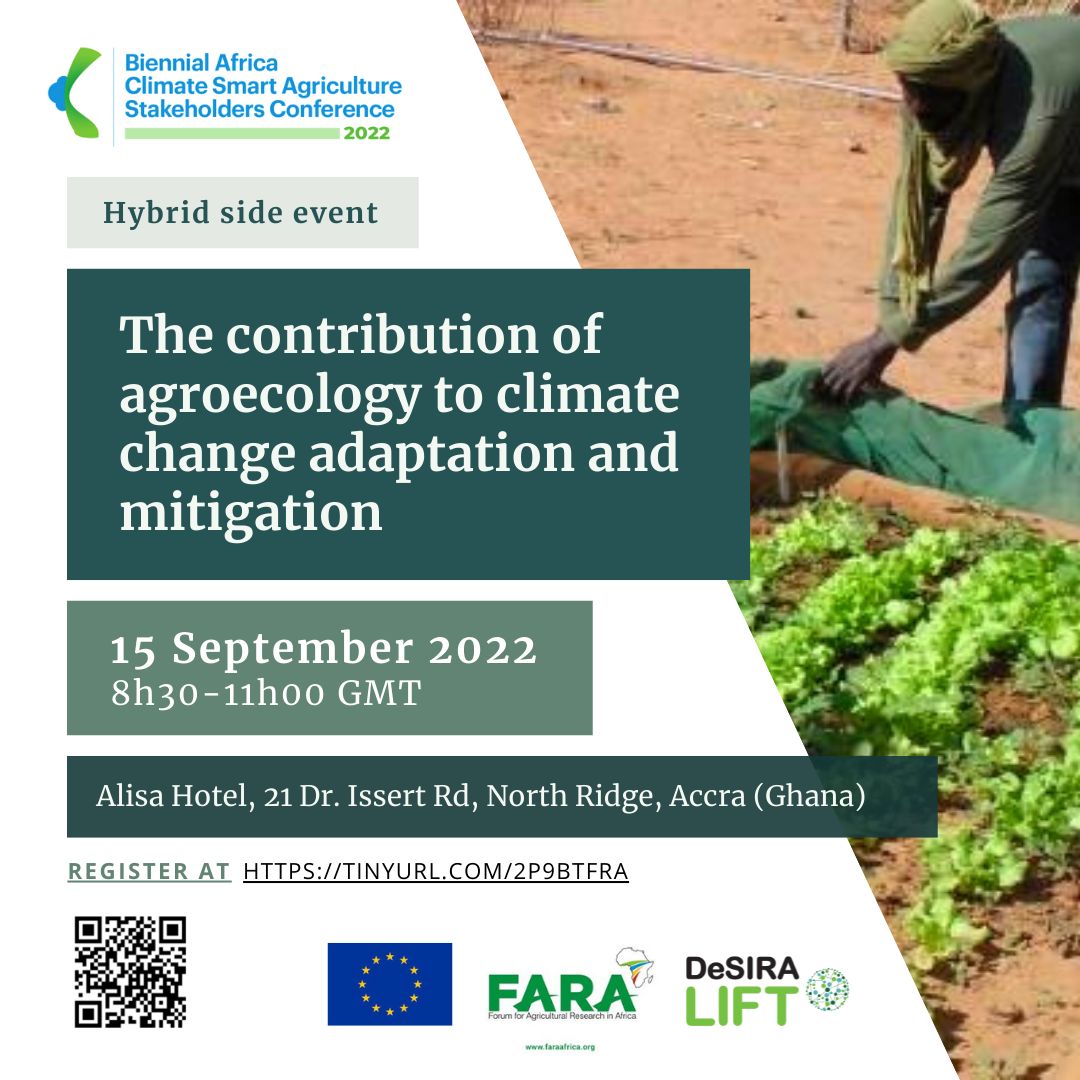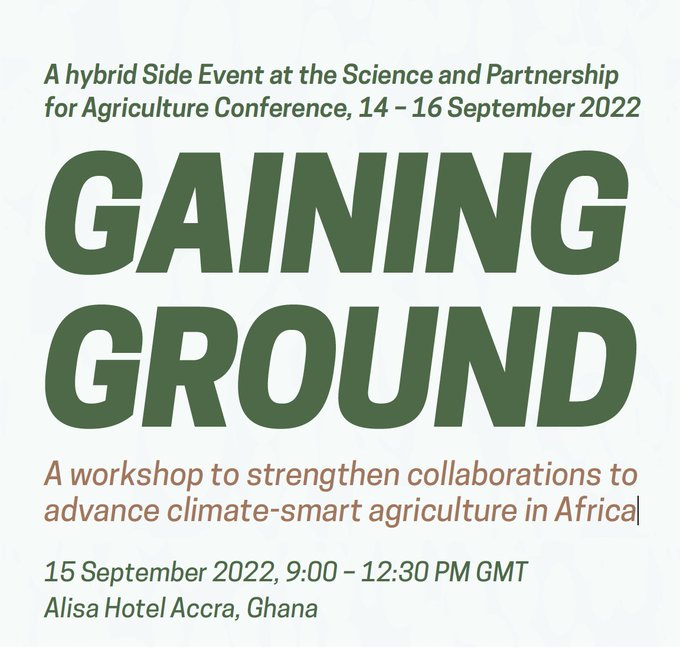The Science and Partnerships for Agriculture Conference is crafted to encapsulate broad-based partnerships at different levels to address key issues in Africa’s agricultural research and innovation space.
The 2022 edition of the Biennial Africa Climate Smart Agriculture Stakeholders Conference
This edition provided opportunities for researchers, academicians and students to share their research findings.
- To discuss agroecological approaches and practices which contribute to climate resilience and concrete ways in which agroecology can support adaptation and mitigation strategies
- To make recommendations to mainstream agroecological principles into the Climate Change and Climate-Smart Agriculture debate and call for investments.
DeSIRA-LIFT supports FARA and its members in two main areas:
- Organising two complementary sessions: (i) a Thematic Paper Presentation on “Compatibility assessment of agroecology and CSA practices”, and (ii) a Side event on “The contribution of agroecology to climate change adaptation and mitigation” showcasing successes from smallholders, private sector operators and CSOs in the field to showcase some sustainable innovations and solutions adopted in Africa.
- Supporting: (i) a review of ten years of African involvement and action in COPs (between CoP 17 and CoP 27) detailing lessons learned and plausible future actions and efforts to achieve the foreseen actions in relation to African agriculture; (ii) the development of a Decadal Plan to implement the African Climate Change Strategy on agriculture. Both reports will be presented at the Biennial CSA Conference. Main preliminary findings will be presented at the Conference.
- Moderation: Cliff Dlamini, Executive Secretary, CCARDESA, Gaborone, Botswana
- A literature review on agroecology, Maria Luisa Paracchini, JRC, Italy
- Agroecological transformation in support of climate change adaptation and mitigation in Africa, Pablo Tittonell, CONICET/University of Groningen, the Netherlands
- The contribution of agroecology to CSA, Suwilanji Sinyangwe, FANRPAN, South Africa
- Ecological Organic Agriculture: A mitigating alternative for climate change, Oluyinka Adewoyin, Department of Crop Science and Horticulture, Federal University, Oye, Nigeria
14/09 Panel: Analysis of framework CSA/Agroecology
- Smallholder Farmers and The Need for Climate-Smart Agriculture in Nigeria, Adebola Adedugbe, Farmideas, Nigeria
- Agronomy-driven climate-smart agriculture: Agronomy and climate adaptation and mitigation, Bernard Vanlauwe, R4D Director at the International Institute of Tropical Agriculture (IITA), Kenya
- Climate-Smart Agricultural Practices for the sustainable food system in Nigeria: An Agroecology-specific Analysis, Iredele Ogunbayo, Innovation Lab for Policy Leadership in Agriculture and Food Security (PiLAF), Nigeria
- Examining the strengths, weaknesses, opportunities and treats of agroecology in ensuring food security and environmental sustainability, Never Mujere, Department of Geography Geospatial Sciences and Earth Observation, University of Zimbabwe, Zimbabwe
- Biodiversity Conservation of Neglected and Underutilized Nigerian Horticultural Crops, Funmilayo Mary Oloyede, Department of Crop Production and Protection, Obafemi Awolowo University, Ile-Ife, Nigeria
14/09 Panel: Agronomic performances CSA/Agroecology/conventional practices
- Agronomic Evaluation of Soybeans (Glycine Max (L.) Merrill) Under Crop Rotation System in The Forest-Savanna Transitory Location in The Humid Tropics, Victor Olowe, Institute of Food Security, Environmental Resources and Agricultural Research (IFSERAR), Nigeria
- Agroecological Cropping Systems Management: Impact of Conservation Agriculture in Maize-Based Cropping Systems, Anthony Imoudu Oyeogbe, University of Ibadan, Nigeria
- Agroecological Differentials in Crop Production: Evidence from Smallholder Rice Producers in Nigeria, Tenitayo Adeyemo, Nigerian Institute of Social and Economic Research, Nigeria
- Analysis of Agroforestry Practices Among Small-Scale Farmers in Southern Guinea Savannah Zone of Nigeria, Adeola Oloyede, Dept of Agricultural Economics, University of Ilorin, Nigeria
- Mangrove Forest Restoration Nature-Based Solution to Climate Change: An Agroecological Contribution to Climate Sensitive Agriculture in Coastal Communities, Ogunnaike Gbemisola, Dept of Agricultural Economics and Farm Management, Olabisi Onabanjo University, Nigeria
- Assessment of stakeholders’ satisfaction for Sustainable ecological agricultural practices that promote climate-smart agriculture in Nigeria, Taofeeq Yekinni, Agricultural Extension and Rural Development, University of Ibadan, Nigeria
- Enhancing agroecology as an effective Climate Smart Agriculture approach to reduce wildfires vulnerability in the savannah ecological zone of Ghana, Aline Mwintome Naawa, WASCAL Doctoral Program, Université de Lomé, Togo
13 September 2022. Programme for Climate-Smart Livestock Systems
GIZ, the World Bank and the International Livestock Research Institute (ILRI) organised a virtual closing event of the Programme for Climate-Smart Livestock Systems. After almost five years of implementation, the programme shared key findings and lessons learned on supporting the development of climate-smart livestock systems in Africa. Experts in the field showcased selected adaptation and mitigation measures and discussed with key stakeholder the role of policies and finance to bring climate-smart livestock practices and measures to scale.The Programme for Climate-Smart Livestock Systems (PCSL) is implemented by Deutsche Gesellschaft für Internationale Zusammenarbeit (GIZ) together with the International Livestock Research Institute (ILRI) and the World Bank on behalf of the German Federal Ministry for Economic Cooperation and Development (BMZ).
15 September 12022. Gaining ground: a workshop to strengthen collaborations to advance climate-smart agriculture
As part of the GRA’s continuing commitment to strengthening countries’ scientific capability and institutional capacity to increase productivity, enhance resilience and reduce greenhouse gas emissions, we are pleased to present “Gaining ground” – a workshop to strengthen collaborations to advance climate-smart agriculture (CSA).The workshop/side event showcased science-based practices that illustrate pathways to climate-smart, low-emission agricultural development. The event also offered an open platform to discuss how to connect the various emerging opportunities and different actors engaged in CSA to help advance long-term CSA change (See details in flyer below). Expert facilitators shared their personal experiences in working with different stakeholders from both developed and developing countries, answer questions, and highlighted further opportunities for research collaboration provided by the GRA and other related science networks.
- Introduction Dr. Sega Ndao, NZAGRC
- Keynote address State of knowledge and policy efforts to improve inventory estimates and mitigate livestock GHG emissions in Africa. Dr. Claudia Arndt, ILRI
- Scaling up CSA: What are the missing links? The context for scaling up CSA, practical elements to guide thinking and planning around scaling up and pathways for taking CSA to scale in Sub-Saharan Africa. Dr. Ackim Mwape, NZAGRC
- Demonstrating CSA Two invited papers demonstrating (i) how effective low-carbon, climateresilient technologies and systems can facilitate scale up and replication; and (ii) how linking government and university sectors in CSA research programmes can have a strong policy context. Dr. Edward Yeboah, CSIR
Panel discussion on how collaborative relations in
CSA can enhance food system
resilience and climate protection.
- Dr. Caludia Arndt, ILRI
- Dr. Kofi Konadu Boateng, GMH
- Dr. Wilhelmina Quaye, CSIR
Related: Agroecology Dialogue Series
- About the Dialogues
- 23/06 Dialogue 1: The interface between agroecology and territorial approaches for food systems transformation
- 15/09 Dialogue 2: Beyond the farm: Exploring the synergies between the agroecology and conservation communities
- 29/09 Dialogue 3: Agroecology as a response to agri-input scarcity







No comments:
Post a Comment